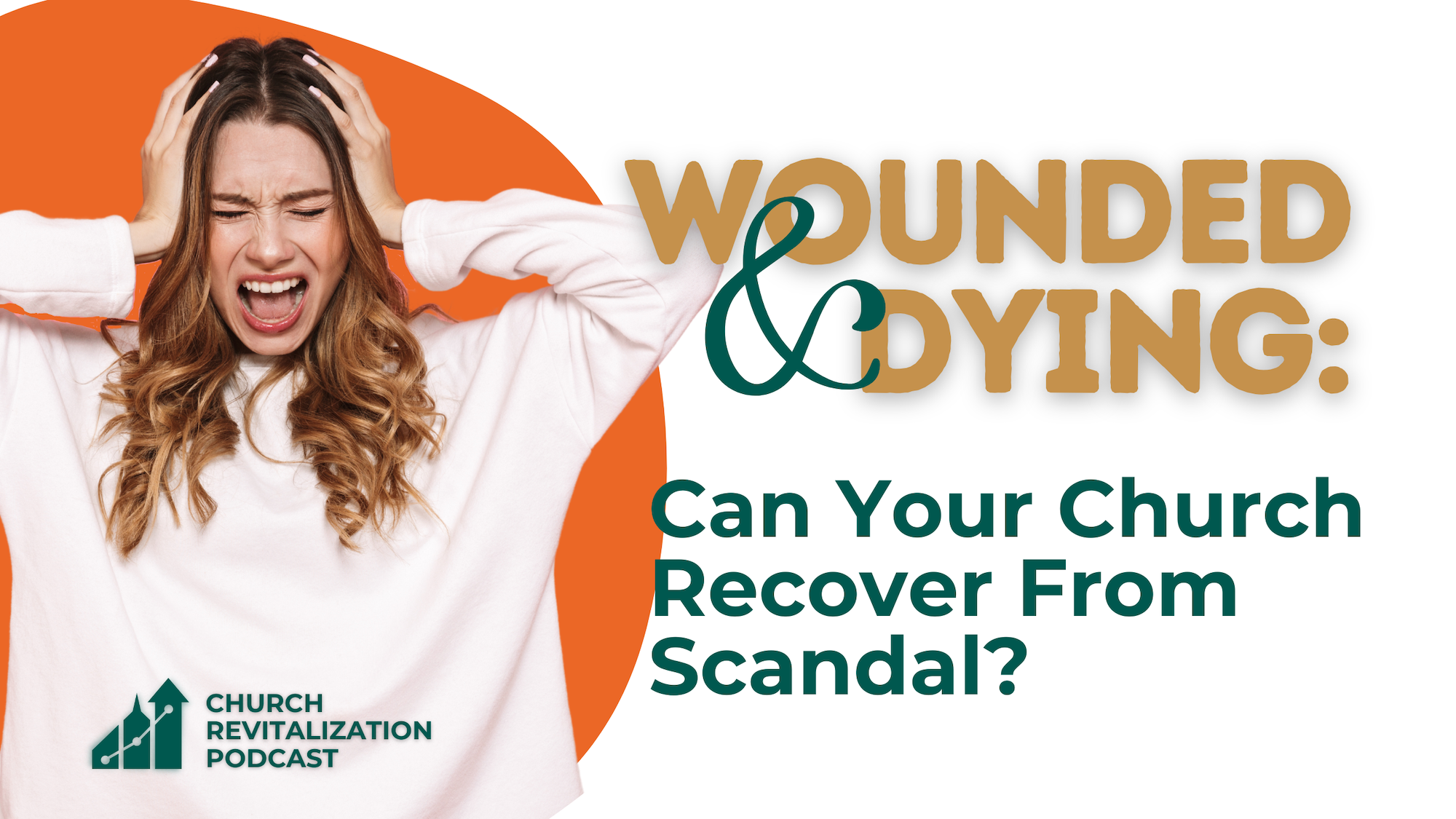The Church Revitalization Podcast – Episode 206
If you stay in ministry long enough, chances are you or someone you love will be impacted by a church scandal. We wish it weren’t true, but sin exists even within Christ’s church. In our broken world, scandals will continue to plague congregations until Christ returns.
There’s some solace in knowing even the earliest churches faced scandals. Nearly every New Testament letter addressed a theological debate or moral failure. Remember the man sleeping with his father’s wife in 1 Corinthians? A shocking scandal even today!
But before you assume your church will inevitably face such an ordeal, there is hope. God always provides a path to restoration, no matter how far a church has fallen. The very existence of Paul’s letters, and Christ’s messages to the churches in Revelation, show God desires to renew congregations struggling with sin. Failure does not have to be final.
Today we’ll explore the common sources of church scandals, five key steps to recovery, and a message of hope for leaders navigating these tragic situations. By God’s grace, even the most broken churches can be rebuilt into places of health and holiness once again. There is light at the end of the tunnel.
Subscribe below to never miss an episode.
Common Sources of Church Scandal
While high-profile church scandals sometimes make headlines, many congregations encounter crises known only to insiders. Yet whether the details go public or not, scandals can shatter trust and unity. The most frequent sources of scandal involve sexual abuse and financial misconduct. But other moral failings can also wreak havoc. Let’s explore the major categories.
Sexual Abuse Allegations
Claims of sexual abuse often generate the biggest scandals. Allegations may target clergy, staff, or volunteers. Whatever the source, take all accusations seriously. In most states, clergy must report suspected abuse of minors to authorities. Though crimes against children cause the greatest outrage, adult abuse also merits concern.
Even if deemed “consensual,” relationships involving power dynamics hardly reflect “above reproach” conduct. Regardless of legal status, sexual scandals derail churches. Rather than debating consent, the priority should be preventing abuse and caring for victims.
Though the Southern Baptist Convention has made headlines with their list of more than 700 credibly-accused abusers, this is by no means exclusive to the SBC. However, many denominations either don’t have a database or have not made this information available to the public. Therefore, it’s hard to quantify how widespread these problems are. In our discussions with churches of various backgrounds, we tragically see these challenges on a regular basis.
Financial Scandals
Misuse of money can also destroy trust. Unlike abuse, financial scandals typically involve staff and volunteers more than clergy. But mishandled finances still damage credibility. Embezzlement or lavish spending by leaders quickly erodes confidence. Any lack of transparency or stewardship can signal misconduct. Financial scandals may not be outright illegal, but inappropriate use of funds for extravagance can still enrage members.
Financial crime in the church is more common than you may think. In 2013, a study from Gordon-Conwell Theological Seminary found that fraud in the church was “projected to be $37 billion worldwide, or nearly 6% of the total $594 billion given to churches.” Financial mismanagement was projected to cost the global church $8 billion. Contrast this with the projection for money spent on global mission–which was just $32 billion. Experts estimate that “as much as 95% of fraud within churches goes undetected or unreported.”
Other Moral Failures
Beyond sex and money issues, other moral failures plague congregations. One common problem is addiction. Leaders secretly struggling with substances or pornography set a poor example. A related issue involves toxic leadership through intimidation and anger. Rather than exemplifying the fruit of the Spirit, some pastors rule through fear. Lying and exaggeration also precipitate crises. When leaders lack integrity, trust evaporates. Unethical power grabs exclude laity from decisions and breed resentment. Hypocrisy and neglecting family obligations also reflects poor character.
The overriding problem is leaders fail to mirror Christ in word and deed. When those assuming moral authority lack ethics themselves, scandal inevitably follows. Scripture requires much higher standards for shepherds of God’s flock.
Five Steps to Recover from a Scandal
Remember that failure does not have to be final, and that recovery is possible by God’s grace. But simply wishing for things to be better will not make it so. Your church will need to be proactive and take five necessary steps in order to recover from a scandal. Let’s explore each in detail.
Step 1: Be Humble
When scandals strike a congregation, a natural temptation is to downplay the situation and quickly return to normal routines. Leaders may be reluctant to directly acknowledge wrongdoing out of instinct to protect the institution’s reputation. However, this attitude severely hampers recovery.
A much better initial response is to foster a spirit of congregational humility. This starts with leaders modeling repentance through prayerful self-examination and willingness to confess sins openly. Rather than defensiveness, the right posture is humility and honesty.
The church should devote extended time to lamenting how it failed to live up to biblical ethics. Repentance should permeate the individual and collective psyche. This lays a foundation for God’s restoration.
True healing only comes through humility. Rather than rushing to resume activities, take time for soul-searching. Be willing to admit failure without equivocation. Let godly sorrow lead to repentance. Approach recovery as a process, not a quick fix. Humility paves the way for long-term reconciliation.
Step 2: Seek Wise Counsel
After the initial humbling process, it’s crucial to pursue outside help in navigating the situation. A common mistake is only seeking counsel from denominational superiors or others with vested interests. This often generates mere PR damage control rather than substantive solutions.
Instead, try to find respected leaders with experience helping churches recover from scandals. Consider independent mediation from pastors in other regions or denominations. The key is getting grounded biblical advice, not just institutional protection.
Welcome hard questions and accountability from these outside perspectives. Be willing to confess sins specifically. Seek to understand root issues, not just public relations optics. The right counsel comes from those who care about the spiritual health of the body, not institutional self-preservation.
Another benefit of outside counsel is gaining confidential support for the emotional toll scandals take on leaders. You need faithful friends to lean on who will tell you the truth in love. Seeking broad input provides wisdom and allows fresh eyes to assess damage objectively.
Step 3: Prioritize Transparency
A common response to scandal is to minimize the situation or cover up details. This is often done to protect leaders or the church’s reputation. However, this approach severely damages trust. Transparency is absolutely essential for congregations to heal.
Resist the urge to downplay sins or withhold facts. Strive to err on the side of full disclosure in all communication about the scandal. Things may get worse before they get better, but truth sets the stage for recovery. Even if it makes leadership look bad, lay everything on the table.
Congregants can handle difficult news when handled forthrightly. Do not underestimate their grace and wisdom. Transparency is not easy but vital to restoring trust and unity. Avoid spin or image management. Stay focused on biblical integrity.
Step 4: Genuinely Repent
Transparency must be accompanied by genuine repentance to facilitate healing. Mere apologies or resignations without personal change often ring hollow. True repentance goes deeper than words to demonstrate life transformation.
Amid the fallout, leaders should exemplify taking responsibility for sins through restitution and lasting change. Make amends where possible, whether financial or relational. Be quick to listen, slow to speak. Back up apologies with evident spiritual growth.
Model humility, accountability and servant leadership. Do not view confession as a box to check but as the start of a lifelong journey of sanctification. Repentance signals a renewed commitment to pursuing holiness with sobriety. Only God’s grace can heal the deepest wounds.
Step 5: Focus on Christ & the Mission
When embroiled in scandal, it’s tempting to rely on human wisdom and damage control to manage fallout. However, true recovery requires total dependence on Christ. Only God’s grace and mercy can heal the deep wounds left by moral failure.
Rather than obsessing over the scandal, shift focus to Jesus and get back to the Great Commission. You cannot change the past, so look ahead to better serving Christ in the future. Remember that the mission is making and maturing disciples.
The scandal likely happened because the church lost sight of Jesus and biblical purpose. Do not repeat that mistake by making the scandal the main focus. Demonstrate that repentance is real by acting on Christ’s teachings wholeheartedly.
Keep reaching out locally and globally with the gospel. Address internal issues, but do not become inwardly focused. Model newfound authenticity, humility and grace. By God’s strength, the scandal can propel you into a deeper relationship with Christ and more faithful ministry.
There is Hope
When embroiled in scandal, it is easy to despair and feel disqualified from ministry. However, we serve a God who specializes in bringing beauty from ashes, repairing broken vessels, and transforming them into something new.
With Christ, failure does not have to be final. Paul persecuted Christians furiously before becoming the greatest missionary. Peter denied Jesus but went on to boldly lead the early church.
God patiently restores what is broken. “I will restore to you the years that the swarming locust has eaten…” (Joel 2:25). “He heals the brokenhearted and binds up their wounds.” (Psalm 147:3)
Scandal does not surprise God nor thwart his purposes. His strength is perfected in our weakness. As we fix our eyes on Jesus, he redeems and renews our churches into something better than before.
Christ came for the sick, not the healthy. He chose flawed people to build his church. If humble and repentant, God can use your church powerfully. Hope remains. God’s forgiving grace awaits. Our mandate is to faithfully shepherd the flock whatever the cost.
BONUS: Watch this episode on YouTube.


Scott Ball is the Vice President and a Lead Guide with The Malphurs Group. He lives in East Tennessee with his wife and two children. (Email Scott).

